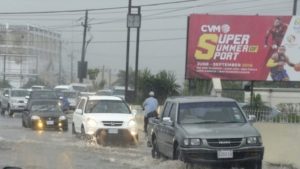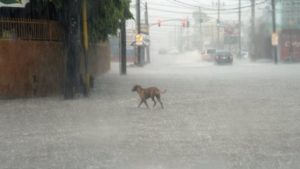
AP: Bad weather from the storm has already arrived in parts of Jamaica.
One of the most powerful Atlantic hurricanes in recent years is expected to cause flooding and landslides when it passes by Jamaica and Haiti.
The fast-approaching Matthew, a Category Four storm, could bring up to 40 inches (102cm) of rain. Heavy rain and winds have already hit parts of Jamaica, with floodwaters blocking roads in the capital Kingston.
Haiti could be more seriously affected when the hurricane passes over the country’s southwest later on Monday.
The Haitian authorities have urged people to stock up on food and water and secure their homes. Thousands are still living in tents following the huge earthquake in 2010.
Matthew is later expected to reach eastern Cuba.
As it is moving slowly north over the Caribbean, the storm’s maximum sustained winds are reaching 130mph (215km/h), the U.S. National Hurricane Center (USNHC) said on Monday.
Its center is expected to pass to the east of Jamaica and make landfall to the southwestern tip of Haiti later in the day before reaching eastern Cuba, the USNHC said.
Southern areas of Haiti including Jeremie and Les Cayes are expected to see the worst of the heavy rain and treacherous winds.
“Wherever that center passes close to would see the worst winds and that’s what’s projected to happen for the western tip of Haiti,” U.S. hurricane specialist John Cangilosi said. “There is a big concern for rains there and also a big concern for [a] storm surge.”
Forecasters say the storm is expected to pass east of Florida through the Bahamas, although it is too soon to say whether it will hit the U.S. coast.

AP
Haitian officials say that about 1,300 emergency shelters have been constructed across the country, sufficient to accommodate 340,000 people. Both airports in Haiti are closed.
Warnings have been broadcast over the radio urging people to pay attention to evacuation warnings, especially because some people are expected to try to stay in their homes to protect them from damage.
Interim President Jocelerme Privert on Sunday advised Haitians to be prepared to move quickly in an address on state radio.
“To those people living in houses that could collapse, it’s necessary that you leave these houses to take refuge in schools and churches,” he said.
In Jamaica, emergency services rushed to protect buildings and get people in safe buildings. Long queues formed outside stores and at petrol stations as people stocked up.
The Jamaican government urged people to evacuate and prepare for the storm two days ago.
Read more here.


